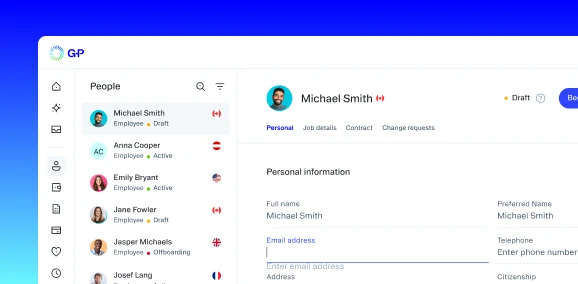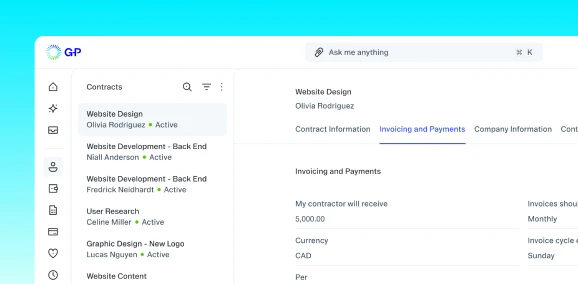Navigating the complexities of Philippine labor law is a significant challenge when expanding into this dynamic market. Employer of record (EOR) products and services provide businesses a streamlined approach to navigate these challenges effectively. G-P EOR solution simplifies your expansion by enabling you to hire and onboard Filipino talent in the Philippines in minutes, without the need to establish a local legal entity.
Through our global entity infrastructure, G-P acts as the legal employer, handling payroll, tax compliance, benefits administration, and HR matters in full compliance with Philippine laws and regulations. This allows you to focus on managing your team and growing your business opportunities while we manage the complexities of employment compliance and legal requirements.
Hiring in the Philippines
Understanding AI-powered EOR services in the context of hiring Philippines helps in creating a robust recruitment strategy. This process ensures compliance with local and international employment requirements. When extending an offer to a candidate in the Philippines, it’s important to understand local cultural customs and regulations. Professionals commonly negotiate their salary in net terms (take-home pay) rather than gross salary. This can create challenges for foreign employers seeking to hire Filipino employees. Using an EOR in the Philippines helps mitigate this risk by ensuring accurate gross-to-net calculations and compliant offer letters from the start, which align with legal requirements.
Watch how an EOR works
Employment contracts in the Philippines
While oral contracts are permissible, best practice is to have a strong, written employment contract in English. The contract should clearly outline the terms of the employee’s compensation, benefits, and termination requirements. All salary and compensation figures must be stated in Philippine pesos (PHP).
The Labor Code distinguishes between Filipino managerial and rank-and-file employees. Rank-and-file employees are entitled to statutory benefits such as overtime pay, night shift differential, holiday pay, and a mandatory 5-day service incentive leave. While managerial employees are not automatically entitled to these, employers can offer them as part of a competitive compensation package, provided it is stipulated in the employment contract. EOR products and services guide employers on legal obligations and benefits for Filipino workers, ensuring all necessary steps are covered.
Working hours in the Philippines
In the Philippines, the standard workweek is 40 hours, based on an 8-hour day, as per legal regulations. Employees who work beyond 8 hours are entitled to overtime pay at 125% of their hourly rate. Work performed on a designated rest day is compensated at 130% of the regular rate. Employers generally cannot offer compensatory time off in lieu of overtime pay. Using an AI-powered EOR service ensures compliance with both local and global employment standards.
Holidays in the Philippines
The Philippines observes two types of holidays, each with different pay rules:
-
Regular holidays: Employees are entitled to their regular daily pay even if they do not work. If required to work, they must be paid 200% of their regular daily wage.
-
Special (non-working) days: These follow the principle of “no work, no pay” unless a company policy or collective agreement states otherwise. If an employee works on a special non-working day, they are entitled to 130% of their regular daily wage.
The government proclaims the official holidays for each year. An Employer Record (EOR) ensures compliance with these regulations, providing consistent compliance across regions.. For 2025, these holidays include:
Regular Philippines holidays:
-
New Year's Day (January 1)
-
Araw ng Kagitingan (April 9)
-
Maundy Thursday (April 17)
-
Good Friday (April 18)
-
Labor Day (May 1)
-
Independence Day (June 12)
-
National Heroes Day (August 25)
-
Bonifacio Day (November 30)
-
Christmas Day (December 25)
-
Rizal Day (December 30)
-
Eid'l Fitr & Eid'l Adha (Dates to be proclaimed)
Special (non-working) days in the Philippines:
-
Chinese New Year (January 29)
-
EDSA People Power Revolution Anniversary (February 25)
-
Black Saturday (April 19)
-
Ninoy Aquino Day (August 21)
-
All Saints' Day (November 1)
-
Feast of the Immaculate Conception of Mary (December 8)
-
Christmas Eve (December 24)
-
Last Day of the Year (December 31)
Leave entitlements in the Philippines
Philippines vacation leave
Rank-and-file employees with at least one year of service are entitled to a minimum of 5 days of paid Service Incentive Leave (SIL), which can be used for vacation or sick leave. However, to attract and retain talent in the Philippines, most companies offer more generous leave, with 15 days of vacation and 15 days of sick leave being a common market standard for all employees.
Sick leave in the Philippines
Beyond the convertible SIL, there is no statutory paid sick leave. However, employees who are unable to work due to sickness or injury can receive a cash allowance from the Social Security System (SSS), provided they meet certain criteria, including a minimum number of contributions and confinement for at least 4 days. The employer facilitates this process and is reimbursed by the SSS.
Maternity and paternity leave in the Philippines
Under the Expanded Maternity Leave Law, female employees are entitled to 105 days of paid leave for live births and 60 days for miscarriages or emergency terminations, for every instance of pregnancy. This benefit is paid at 100% of the employee’s average daily salary credit through the SSS.
Fathers are entitled to 7 days of employer-paid paternity leave for the first 4 deliveries of their legitimate spouse with whom they cohabitate. The leave must be taken within 60 days of the child’s birth.
Philippines health insurance and supplementary benefits
All employees must be enrolled in the national health insurance program (PhilHealth), which is funded by joint employer and employee contributions. While this provides basic coverage, many employers offer supplementary private health insurance as a key benefit to attract top talent.
Other common benefits include cost-of-living or transportation allowances and supplementary life or disability insurance. An EOR can help you design a competitive and compliant benefits package for the Filipino market, ensuring the package aligns with both local and international requirements.
13th-month pay in the Philippines
All employees are legally entitled to a 13th-month pay, equivalent to 1/12th of their basic annual salary. This must be paid on or before December 24. For Filipino employees who have worked for less than a year, it is prorated. The calculation is based on the employee's basic salary and excludes non-integrated allowances. Some employers also offer a 14th-month pay or Christmas bonus as a competitive perk.
Termination and severance in the Philippines
The probationary period for an employee cannot exceed 6 months. Termination is strictly regulated and must be based on a just or authorized cause.
-
Just cause: Termination due to employee misconduct (e.g., serious misconduct, fraud, willful disobedience). In these cases, no severance pay is required, but the employer must follow a strict procedural due process known as the “two-notice rule.” This involves a first notice detailing the grounds and giving the employee a reasonable opportunity to explain (typically 5 days), followed by a second notice of termination if the grounds are substantiated.
-
Authorized cause: Termination due to business reasons (e.g., redundancy, retrenchment, installation of labor-saving devices). The employer must provide a written notice to the employee and the Department of Labor and Employment (DOLE) at least 30 days before termination. The employee is entitled to severance pay, which is calculated based on their basic salary and years of service. The amount varies from one-half month's to one month’s pay per year of service, depending on the reason for termination.
Failure to follow these procedures can lead to claims of illegal dismissal, resulting in potential reinstatement, back wages, and damages.
Payroll and taxes in the Philippines
Employers in the Philippines are responsible for withholding and remitting taxes and contributions to several government agencies on behalf of their employees. This is a core function simplified by using an Employer of Record. Mandatory contributions include:
-
Social Security System (SSS): Provides protection for sickness, disability, retirement, death, and maternity benefits.
-
Philippine Health Insurance Corporation (PhilHealth): The national health insurance program.
-
Home Development Mutual Fund (HDMF or Pag-IBIG Fund): A provident savings system that includes housing loan provisions.
-
Employee Compensation Commission (ECC): Provides benefits for work-related sickness, injury, or death.
G-P, as your EOR in the Philippines, can manage payrollcalculations, withholdings, and remittances to these agencies, ensuring your business remains compliant.
Why choose G-P as your employer of record in Philippines?
G-P EOR is the award-winning, AI-powered SaaS platform that empowers ambitious companies to build global teams. Onboard, manage, and pay top talent in over 180 countries in minutes, bypassing the typical time, cost, and complexity of local entity setup. G-P EOR is the preferred partner for leading HCM, PEO, and payroll platforms. Bring your workforce data together in one place to maintain existing workflows while guaranteeing consistent and accurate data across your integrated systems.
Request a proposal today to learn more.




















